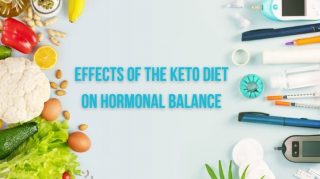The keto diet, popular for weight loss, could lead to hormone imbalances that could have negative consequences, particularly for women.
In recent years, the keto diet has become a very popular weight loss method. The keto diet focuses on the proportion in which you eat the macronutrients necessary for your body. Specifically, the keto diet focuses on eating very low amounts of carbohydrates and replacing them with healthy fats.
The diet has been shown to be quite effective in burning fat, leading to weight loss. However, your body requires adequate amounts of all macronutrients, including carbohydrates, to function properly. Specifically, the disproportionate amounts of carbs consumed to fats on keto can throw off the delicate balance of your hormones.
The keto diet can lead to hormone imbalance. It can have both positive and negative effects on hormone production in both men and women. Women, in particular, can be negatively impacted in terms of hormone balance by the keto diet.
Let’s take a close look at how the keto diet can cause hormone imbalance in both men and women and how hormone replacement therapies such as growth hormone therapy may be able to help mitigate the hormone imbalances that could be caused by the keto diet.
The Basics of the Keto Diet
The keto diet is characterized by a significant reduction in carbohydrate intake, typically to less than 50 grams per day while increasing the consumption of healthy fats and maintaining a moderate intake of protein. This dietary shift triggers the production of ketones, which the body uses as an alternative fuel source. As a result, the keto diet has been associated with various health benefits, including weight loss, improved insulin sensitivity, and enhanced mental clarity.
Hormonal Imbalance
Your hormones are your body’s chemical messengers. They regulate everything from growth to metabolism to sexual health. All of your hormones must operate in a delicate balance for optimal health. It is a complex system that must function in a delicate balance. If the level of even a single critical hormone is off, it can have dire health consequences.
Effects of the Keto Diet on Hormonal Balance

Generally speaking, the keto diet is a healthy way to lose unwanted pounds. However, because it involves the restriction of certain macronutrients that are necessary for hormone production and because of the impact “ketosis” has on glucose metabolism, the keto diet can impact the delicate hormone balance.
The keto diet can have both positive and negative effects on your hormone balance. Let’s look at some of the positive effects and how to minimize or mitigate the negative effects of keto on hormone balance.
Positive Effects on Hormonal Balance
The primary positive effect that the keto diet has on hormones is directly related to how it helps you lose weight. One of the main hormonal changes associated with the keto diet is its effect on insulin and blood sugar levels. By reducing carbohydrate intake, the keto diet can help stabilize blood glucose levels and improve insulin sensitivity, which is particularly beneficial for individuals with insulin resistance or type 2 diabetes. This positive impact on hormone balance can contribute to overall health and well-being.
Negative Effects on Hormonal Balance
While the impact of the keto diet on hormones related to burning fat and metabolism, such as insulin, are positive, the keto diet can also cause hormone imbalances that could be negative.
For example, the keto diet can cause an imbalance in both the male and female sex hormones. Hormones like estrogen and testosterone play crucial roles in the body, affecting fertility, mood, and overall health. Some studies have suggested that a very low-carb, high-fat diet like keto may affect sex hormone levels. In women, the keto diet might lead to changes in menstrual patterns, while in men, it could influence testosterone levels.
Another concern about the keto diet and hormone imbalance has to do with thyroid hormones. Research suggests that prolonged adherence to a strict keto diet may lead to reduced levels of thyroid hormones, particularly T3 (triiodothyronine). However, these changes are not typically observed in short-term keto diet studies and may be more relevant to individuals with pre-existing thyroid conditions.
Finally, it has also been suggested that the keto diet could influence the stress hormone cortisol. Some individuals may experience increased cortisol levels when transitioning to the keto diet due to the body’s stress response to carbohydrate restriction. Elevated cortisol levels can potentially lead to negative effects on hormone balance and overall health.
Gender-Specific Considerations
The keto diet can affect the hormone balance in both men and women. Some of the hormonal changes caused by the keto diet are the same in men and women, while others can be gender specific.
Does the Keto Diet Affect Women’s Hormones?
There are more research studies that show a link between keto causing hormone imbalances and affecting women’s hormones, particularly estrogen, more than men’s.

Women love the weight loss results they can achieve on keto; however, it comes with a downside: the keto diet can have a negative effect on women’s hormones. A very common side effect for women on the keto diet is disrupted or irregular menstrual cycles, with some women on keto reporting that they have stopped menstruating together!
In fact, one study on keto found that 45 percent of the female participants in the study who lost weight also reported menstrual dysfunction. One of the main reasons for this is that as weight drops, women lose fat they produce less estrogen. This can happen on any diet and not just keto; however, since weight loss can be dramatic on keto, estrogen decline is a common side effect.
Decreasing estrogen levels can be a cause for concern, not only because of how that can cause irregular periods. Just as it can just before, during, and after menopause, dropping levels of estrogen caused by keto can lead to sexual health issues such as vaginal dryness and lowered libido. It can also impact fertility, so women wishing to become pregnant should speak with their doctors before deciding to go on a keto diet.
However, not all of the impact of keto on a woman’s estrogen level is negative. The reduction in estrogen that can occur in keto was found to help women with Polycystic ovary syndrome (PCOS), a condition where you have few, unusual, or very long periods. A study on women with PCOS found that keto improved insulin resistance, body weight, and overall hormone balance.
This may have to do with the impact that the keto diet can have on “estrogen dominance.”
Estrogen Dominance and the Keto Diet
As mentioned above, the keto diet can lower estrogen levels. Generally speaking, this is a negative for most women. However, one potential positive hormone effect of the keto diet for women is that it can help mitigate “estrogen dominance.”
Estrogen dominance is one of the most common hormone imbalances in women. When it occurs, it means there is a disproportionate amount of estrogen to progesterone in a woman’s body. This “estrogen dominance can lead to heavy periods, PCOS, mood swings, decreased sex drive, anxiety, and fatigue. By reducing estrogen levels, the keto diet can help mitigate estrogen dominance.
HGH and Women’s Health
Human growth hormone is a critical hormone to both men and women. Specifically for women, HGH has been known to play a role in sexual health and fertility. Growth hormone replacement therapy has been shown in studies to help women with many of the sexual health issues, such as lack of libido and vaginal dryness that can occur as women enter the menopausal years. HGH has also been shown to have a positive impact on egg production and fertility in women. Therefore, it is quite logical to assume that if a woman is experiencing fluctuations in estrogen from keto that cause similar impacts on fertility and sexual health, then HGH could also help in making up for this kind of keto diet-caused hormone imbalance in women.
Does the Keto Diet Affect Men’s Hormones?

The impact of the ketogenic (keto) diet on testosterone levels in men is a topic of ongoing research, and there isn’t a definitive consensus on the matter. Testosterone is a hormone that plays a crucial role in male sexual development and function, as well as muscle mass, bone density, and overall health. It’s influenced by various factors, including diet and lifestyle.
Testosterone levels and male hormonal balance
Some studies and anecdotal reports suggest that the keto diet may have potential effects on testosterone levels:
- Weight Loss: The keto diet is often associated with weight loss, and losing excess body fat can lead to an increase in testosterone levels. Obesity is linked to lower testosterone levels, so if the keto diet helps a person lose weight, it might indirectly lead to higher testosterone levels.
- Insulin Sensitivity: The keto diet can improve insulin sensitivity and reduce insulin resistance. Some research has suggested that improved insulin sensitivity may have a positive impact on testosterone levels because high insulin levels can suppress testosterone production.
- Dietary Fat: The keto diet is high in dietary fats, and fat intake is important for testosterone production. Some studies have shown that diets with adequate healthy fats can support healthy testosterone levels.
HGH Therapy and the Keto Diet
HGH can be a powerful adjunct for both men and women who are trying to lose weight on a keto diet. In and of itself, HGH aids in weight loss by boosting metabolism and increasing your ability to build muscle. A recent study analyzed the impact of growth hormone therapy on muscle mass and power in adult men. The results showed that HGH injections “significantly increased” exercise capacity, led to positive changes in body compositions, and decreased total body fat, and increased lean muscle mass.
Beyond this, supplementing HGH while on a keto diet can make up for the negative impacts that keto could have on estrogen and testosterone levels in men and women.
Generic Conclusions
The keto diet can have both positive and negative effects on hormone balance, primarily depending on the individual and their specific health conditions. While it may improve insulin sensitivity and blood sugar control, concerns have been raised regarding its potential influence on thyroid hormones, sex hormones, and cortisol levels.
To mitigate possible negative effects, individuals should consider moderation, prioritize nutrient-dense foods, monitor hormone levels, and adopt an individualized approach that aligns with their health goals and needs. As with any dietary change, it’s advisable to consult with a healthcare professional before embarking on a keto diet journey to ensure it is a safe and appropriate choice for you.

